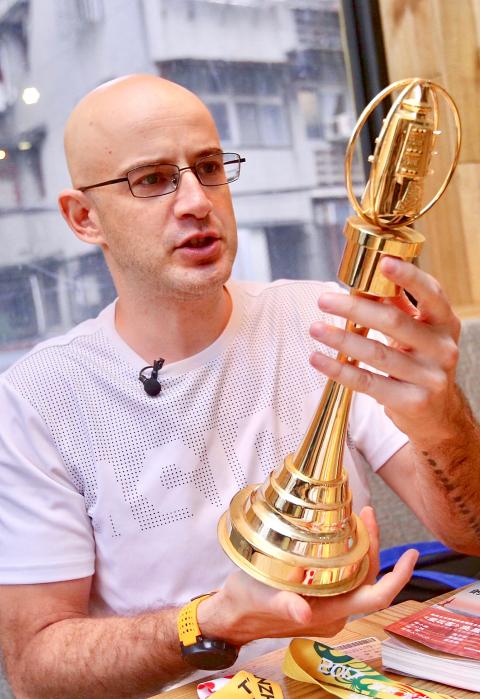Turkish comedian and TV host Ugur Rifat Karlova said he feels he has become a “real Taiwanese” after getting his Republic of China (ROC) identification card last month under an amended immigration law that allows foreigners with “special talent” to gain citizenship without having to renounce their original nationality.
“From now on, no one can call me laowai (老外),” said Karlova, referring to an informal Mandarin word for “foreigner.”
“After I got the ID, I felt like a Taiwanese and I wanted to do more things for Taiwan, the future of Taiwan,” said Karlova, 37, one of 23 foreigners who became citizens under the Standards for Defining High-Level Professionals for Naturalization (歸化國籍之高級專業人才認定標準), which went into effect in March last year.

Photo: CNA
“It was a sense of belonging that money can’t buy, a sense of happiness of being at home,” he added.
Despite having stayed in Taiwan for only 12 years, Karlova, better known by his Chinese name Wu Feng (吳鳳), said he hopes his naturalization will encourage other foreign residents to contribute more.
“I want to tell all foreigners that if you come to Taiwan, you need to cherish the society here,” Karlova said, adding that he wants to send a message to the public that foreigners can create more value for Taiwan, given the chance.
Karlova is the host of a TV travel show called iWalker, which won him a Best Host award at the Golden Bell Awards in 2012. He was the first foreigner to win the award.
He was recognized by the government for distinguished achievement in the field of art and culture, one of six categories of achievement for which foreigners can retain their original citizenship while receiving an ROC identity card.
His naturalization made Karlova the first foreigner to be granted citizenship in that category.
One of the biggest benefits of gaining ROC citizenship is that he can express his views about Taiwanese politics, society and culture on what Karlova describes as “more legitimate grounds.”
Karlova also feels pressure to live up to this recognition of both his reputation and the international image of Turkey, he said.
After graduating from Ankara University’s Department of Chinese and Sinology in 2006, Karlova came to Taiwan on a scholarship and attained a master’s degree in political science from National Taiwan Normal University.
He chose Taiwan because his teachers and schoolmates who had previously been to Taiwan had good things to say about it, he said.
Karlova entered show business after being invited by a scout to play the late George Leslie Mackay, a respected missionary in Taiwan, in a TV program. He married a Taiwanese woman three years ago and they have a two-year-old child.
Karlova said he plans to promote exchanges between Turkey and Taiwan by encouraging more Turkish businesses to invest in Taiwan, inviting YouTubers to come and promote Taiwan and introducing Turkey to Taiwanese.

Taiwan has received more than US$70 million in royalties as of the end of last year from developing the F-16V jet as countries worldwide purchase or upgrade to this popular model, government and military officials said on Saturday. Taiwan funded the development of the F-16V jet and ended up the sole investor as other countries withdrew from the program. Now the F-16V is increasingly popular and countries must pay Taiwan a percentage in royalties when they purchase new F-16V aircraft or upgrade older F-16 models. The next five years are expected to be the peak for these royalties, with Taiwan potentially earning

STAY IN YOUR LANE: As the US and Israel attack Iran, the ministry has warned China not to overstep by including Taiwanese citizens in its evacuation orders The Ministry of Foreign Affairs (MOFA) yesterday rebuked a statement by China’s embassy in Israel that it would evacuate Taiwanese holders of Chinese travel documents from Israel amid the latter’s escalating conflict with Iran. Tensions have risen across the Middle East in the wake of US and Israeli airstrikes on Iran beginning Saturday. China subsequently issued an evacuation notice for its citizens. In a news release, the Chinese embassy in Israel said holders of “Taiwan compatriot permits (台胞證)” issued to Taiwanese nationals by Chinese authorities for travel to China — could register for evacuation to Egypt. In Taipei, the ministry yesterday said Taiwan

‘LIKE-MINDED PARTNER’: Tako van Popta said it would be inappropriate to delay signing the deal with Taiwan because of China, adding he would promote the issue Canadian senators have stressed Taiwan’s importance for international trade and expressed enthusiasm for ensuring the Taiwan-Canada trade cooperation framework agreement is implemented this year. Representative to Canada Harry Tseng (曾厚仁) in an interview with the Central News Agency (CNA) said he was increasingly uneasy about Ottawa’s delays in signing the agreement, especially as Ottawa has warmed toward Beijing. There are “no negotiations left. Not only [is it] initialed, we have three versions of the text ready: English, French and Mandarin,” Tseng said. “That tells you how close we are to the final signature.” Tseng said that he hoped Canadian Prime Minister Mark Carney

POSITIVE DEVELOPMENT: Japan and the US are expected to hold in-depth discussions on Taiwan-related issues during the meeting next month, Japanese sources said The holding of a Japan-US leaders’ meeting ahead of US President Donald Trump’s visit to China is positive news for Taiwan, former Japan-Taiwan Exchange Association representative Hiroyasu Izumi said yesterday. After the Liberal Democratic Party’s landslide victory in Japan’s House of Representatives election, Japanese Prime Minister Sanae Takaichi is scheduled to visit the US next month, where she is to meet with Trump ahead of the US president’s planned visit to China from March 31 to April 2 for a meeting with Chinese President Xi Jinping (習近平). Japan and the US are expected to hold in-depth discussions on Taiwan-related issues during the